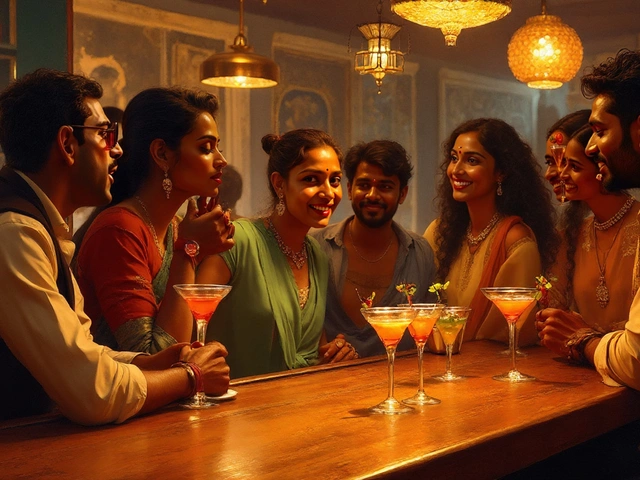
There's an age-old debate among wine enthusiasts: should you drink water before that first sip of wine? For many, the ritual of swirling, sniffing, and sipping a fine vintage is sacred, and any preparation to elevate this experience is worth considering. Hydration is often cited as the key to unlocking wine's potential, but is it really that simple?
Understanding the role water plays in wine tasting goes beyond mere tradition—it's a matter of science and personal preference. As much as wine can be an art form, there's a dose of practicality required to optimize enjoyment. So, if you're ready to unravel the myths, quirks, and science of water before wine, read on. This guide will quench your curiosity, perhaps even your thirst.
- Hydration and Taste: The Connection
- Debunking Wine Myths
- Practical Wine Tasting Tips
- The Role of Water in Wine Pairing
- Conclusion: Finding Your Perfect Balance
Hydration and Taste: The Connection
Imagine you're at a wine tasting event, and you're handed a glass of exquisite Pinot Noir. Your senses are primed, and your palate is just waiting to absorb every nuanced note. But wait—a sommelier advises you to take a swig of water first. Why?
The connection between hydration and taste is more intricate than you might think. When properly hydrated, your taste buds are more sensitive, allowing better differentiation of flavors. Dehydration can dull the senses, making it harder to appreciate the subtle characteristics of a fine wine. This is particularly important if you plan to taste several wines, as repeated sampling can overwhelm an under-hydrated palate.
Scientific Insight
Your body's need for water isn't just about preventing headaches or a dry throat. Saliva, primarily composed of water, plays a crucial role in the tasting process. It acts as a solvent, breaking down the chemical compounds in food and drink, so their true flavors can be more easily detected and appreciated. When dehydrated, your saliva production decreases, diminishing your ability to fully experience a wine's bouquet and finish.
Hydration's Role in Enjoyment
Drinking water before wine doesn't dilute your appreciation—it enhances it. Some experts suggest maintaining a one-to-one ratio: for every glass of wine, consume a glass of water. Not only does this practice help cleanse your palate, but it also combats the diuretic nature of alcohol, which can lead to further dehydration. If you’re wondering just how much water your body might be losing, consider this: a moderate wine drinker can urinate up to 10% more than normal after consuming alcohol.
Ultimately, the goal is to savor each wine to its fullest potential, and proper hydration is a simple yet effective tool in your tasting arsenal.
Quick Tips for Wine Tasting
- Start your tasting session with a full glass of water to prime your palate.
- Alternate between wine and water to maintain hydration throughout the evening.
- Be mindful of your body's signals—if you start to feel dehydrated, take a break for water.
Whether you're a casual enthusiast or dedicated oenophile, remembering the vital role of hydration can profoundly improve your wine tasting experience.
Debunking Wine Myths
Wine, with its rich tapestry of aromas and flavors, often finds itself wrapped in a cloak of myth and mystery. The idea that you should always drink water before wine is just one of many tales told by wine aficionados and skeptics alike. But how many of these beliefs really hold water?
Myth 1: Water Ruins Wine's Taste
One prevailing myth is that drinking water before wine dilutes the tasting experience. In truth, moderate hydration can actually help enhance your palate. A study by the Journal of Sensory Studies found that well-hydrated individuals were better able to discriminate between different wine aromas and flavors. Far from dulling the senses, water might just be your ally.
Myth 2: Only Wine Affects Dehydration
Another common misconception is that only wine impacts your body's hydration levels. However, most alcoholic beverages, including wine, have a diuretic effect, which means they can lead to increased urination and thus, dehydration. Drinking water before and during wine consumption can help mitigate these effects, ensuring a more balanced and enjoyable experience.
"Water is the only drink for a wise man," said Henry David Thoreau, highlighting the essential role of staying hydrated in all aspects of life, including wine tasting.
The Truth About Drinking Water Before Wine
While sipping water might initially feel like a disruption to the elegant ritual of wine tasting, it provides several benefits. Not only does water cleanse the palate, removing any lingering tastes that could alter the perception of the wine, it also helps maintain the mouth’s moisture and temperature—both critical factors in a genuine tasting session.
- Enhances Flavor Recognition: Water refreshes taste buds, making it easier to detect subtle notes in the wine.
- Prevents Hangovers: Keeping well-hydrated helps reduce the severity of hangovers, especially important during events like tastings where multiple wines are sampled.
- Aids Digestive Health: Water assists in the digestion and absorption of alcohol, potentially decreasing discomfort.
Myth 3: All Wines Require the Same Water Strategy
It's also worth noting that not all wines are created equal, and neither are their ideal serving conditions. For example, the consumption strategy for a full-bodied red wine differs from that of a light white wine. Understanding your wine’s characteristics can guide your approach to water consumption.
| Wine Type | Recommended Hydration Practice |
|---|---|
| Red Wine | Mild water intake enhances tannin perception. |
| White Wine | Water helps balance acidity. |
In the end, personal preference will always play a significant role in your wine experience. The next time you're faced with the question of whether to drink water before your wine, remember: it's less about obeying rules and more about finding what enhances and enriches your individual tasting journey.

Practical Wine Tasting Tips
Wine tasting is truly an art form, but that doesn't mean it's reserved only for the sommelier elite. With a few simple wine tasting tips, anyone can enhance their experience and savor the subtle nuances of every bottle. From preparation to tasting techniques, this guide explores how to make the most of your wine journey.
Pre-Tasting Preparations
Before you pour your first glass, consider what surrounds you. The environment can significantly impact your tasting experience. Ideally, taste in a room with ample light so you can appreciate the wine's color clarity and intensity. A neutral space free from strong aromas will allow you to detect the true essence of the wine.
Glassware Matters
Choose your glassware wisely. The right glass can elevate the aromas and flavors of your wine. A glass with a tapered bowl will concentrate the wine's fragrance, enhancing your olfactory enjoyment. And remember, don't fill it to the brim. Allow room to swirl, releasing the full bouquet.
The Tasting Technique
- See: Inspect the wine's color and viscosity. A white surface works best to observe the true hues.
- Swirl: Gentle swirling helps to aerate the wine, releasing aromatic compounds.
- Smell: Stick your nose into the glass and take a sniff. Aroma is a crucial part of the tasting experience.
- Sip: Allow the wine to linger in your mouth, let it touch every part of your palate before swallowing.
- Savor: Reflect on the flavors and finish. How long does the taste linger? What notes do you detect?
"Great wine is always enhanced by preparation and mindfulness," notes renowned wine critic Jancis Robinson, "Understanding and appreciating the journey from grape to bottle elevates every sip."
The Balance of Water
To truly elevate your session, don’t overlook the subtlety of drinking water. Hydration is not just a health tip—it's a practical tool for clearing your palate between tastings. A small sip of water can reset your senses and prepare you for the next wine, allowing an unfettered evaluation of each new glass.
| Water's Role in Wine Tasting | Benefit |
|---|---|
| Hydration | Prevents dehydration, supports focus |
| Palate Cleanser | Resets taste buds between different wines |
| Tannin Mitigation | Balances mouthfeel after strong reds |
Employing these practical tips ensures that every drop of wine is savored, cherished, and fully enjoyed, creating a memorable and enriching experience for both the budding enthusiast and the seasoned connoisseur.
The Role of Water in Wine Pairing
The dance between water and wine is one of subtlety and refinement, and understanding this interplay can significantly elevate your wine tasting experience. While hydration is the most obvious function of water, its role in wine tasting extends far beyond merely quenching thirst. Water can serve as a palate cleanser, a flavor enhancer, and even an alcohol mitigation tool.
Water as a Palate Cleanser
During a tasting session that involves multiple wines, water can act as a neutralizing force between different varietals or courses, ensuring each taste remains distinct. Sipping water cleanses the palate of previous flavors, allowing the next wine to express its bouquet fully. This is essential in professional wine tastings but equally beneficial for casual enthusiasts who wish to appreciate the nuanced differences between wines.
Enhancing the Flavor Experience
Interestingly, the act of sipping water can prepare your taste buds to better perceive the flavors and aromas within the wine. Dry mouth or dehydration can dampen our sensory perception, making wines seem duller than they truly are. A hydrated palate is more sensitive and receptive to complex notes, helping you to better experience delicate aromatics and textures.
Mitigating Alcohol's Effects
Wine, being the delightful but alcoholic beverage it is, can leave one feeling a tad light-headed if consumed too liberally. Drinking water in tandem with wine not only helps counteract alcohol's dehydrating effects but also moderates its impact, allowing for a longer, more enjoyable tasting session without the oft-dreaded hangover.
An Uncommon Practice: Sparkling Water
An intriguing twist is the use of sparkling water, sometimes preferred by sommeliers for its refreshing effervescence and additional cleansing capabilities. The slight fizz can help invigorate the palate in a way still water might not, adding an extra burst of refreshment between heavier reds or rich whites.
Ultimately, the choice of water, still or sparkling, personalizes the tasting experience, allowing for preferences to guide the journey of wine tasting. Whether you're exploring a robust Cabernet Sauvignon or a light Pinot Grigio, integrating water into your routine can enhance the tasting experience, ensuring that each glass of wine reveals its true personality.

Conclusion: Finding Your Perfect Balance
In the world of wine tasting, achieving the perfect balance requires a harmonious marriage between preparation and sensory experience. Hydration, though at times overlooked, plays a crucial role in enhancing the pleasure derived from every glass. Drinking water before indulging in wine doesn't just fend off dehydration; it primes your palate to experience the symphony of flavors with heightened clarity.
Understanding Personal Preferences
Each wine enthusiast is unique, with varied tolerances to alcohol and personal taste preferences. While water can serve as a palate cleanser, ensuring that each sip of wine reveals its true complexity, the amount of water and the timing depend largely on individual needs. Some might find that a few sips of water before and between tastings enhance their experience while sharpening their senses, while others may prefer a thorough rinse only when transitioning between distinctly different wines.
Scientific Insights
Research has shown that maintaining proper hydration can positively impact sensory perception, including taste and smell. These senses are essential for appreciating the full range of a wine’s aromatic and flavor nuances. Moreover, staying hydrated could potentially mitigate some of the less pleasant physical effects associated with alcohol consumption, such as headaches or fatigue.
| Condition | Effect of Hydration |
|---|---|
| Improved Taste Sensitivity | Increases the ability to distinguish flavors |
| Mitigation of Hangovers | Reduces the risk of dehydration-related symptoms |
Practical Tips
- Start your wine-tasting journey with a glass of water to cleanse the mouth and prepare your taste buds.
- Keep sipping water between different wines, especially when transitioning from heavy reds to lighter whites.
- Listen to your body. If you’re feeling dehydrated, take a break to drink more water before continuing your tasting.
Ultimately, the goal is to fully enjoy the expression of the wine at hand. Whether you’re unwinding with a glass after a long day or savoring a bottle during a gourmet dinner, the balance between hydration and indulgence enhances the tasting experience, making it more rewarding and enjoyable. So next time you pour yourself a glass of wine, consider starting with water—your palate and your body will thank you.





Categories